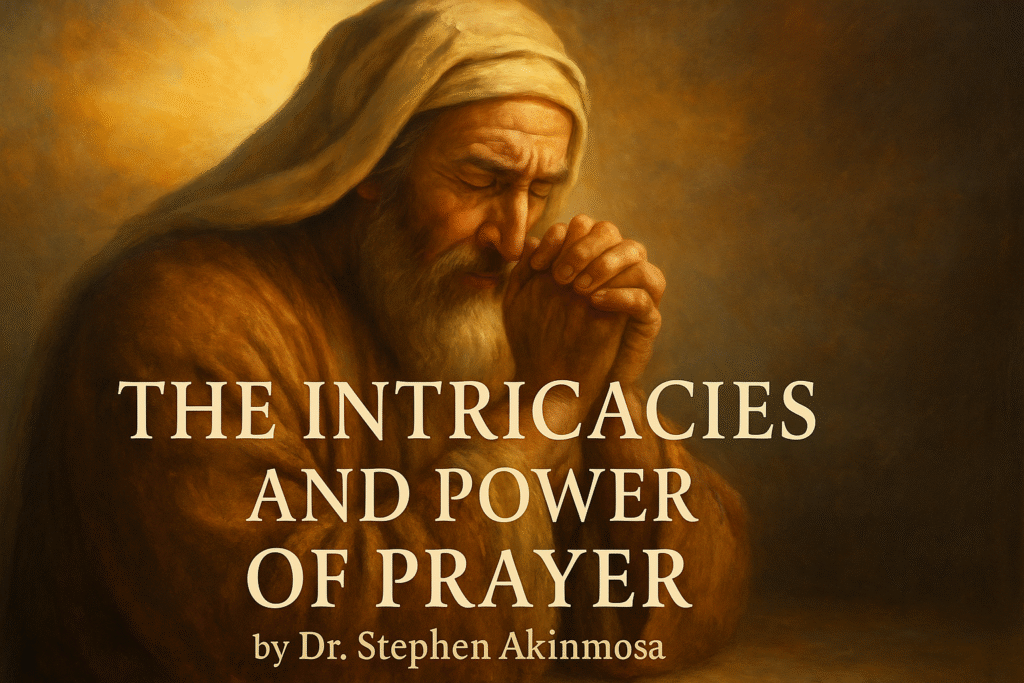The Power of Prayers and Their Intricacies
“The earnest prayer of a righteous person has great power and produces wonderful results.” — James 5:16 (NLT)
Introduction: Prayer – The Divine Dialogue
Prayer is not a monologue of religious words—it is a sacred dialogue between God and humanity. It is not simply a spiritual discipline but the very breath of the believer’s soul. Through prayer, we are ushered into the throne room of grace, welcomed as children to commune with our Heavenly Father (Hebrews 4:16). It is through prayer that burdens are lifted, hearts are aligned, purposes are revealed, and divine power is released.
1. The Foundation of Prayer – Relationship, Not Ritual
Jesus did not teach His disciples how to preach, but He did teach them how to pray (Luke 11:1). That reveals the weight of prayer in the life of a believer. At its core, prayer is about relationship. God desires communion with His people (Jeremiah 33:3). When prayer becomes ritual without relationship, it loses its transforming power.
The Lord’s Prayer (Matthew 6:9–13) begins with: “Our Father…”—a declaration of intimacy and belonging. Before requests are made, worship and acknowledgement of God’s fatherhood and holiness are central. This teaches us that prayer is rooted in trust and sonship, not performance.
2. The Power of Prayers – Changing Circumstances, Shaping Eternity
Scripture is saturated with testimonies of prayer’s power:
-
Elijah prayed and it did not rain for three and a half years; he prayed again, and heaven gave rain (James 5:17–18).
-
Hannah poured out her soul in prayer, and God gave her a son—Samuel, who became a prophet to Israel (1 Samuel 1:10–20).
-
Daniel prayed faithfully and influenced empires; his prayers brought angelic visitation and insight (Daniel 9:3, 20–23).
-
Jesus prayed before major decisions, during times of sorrow, and even while hanging on the cross (Luke 22:41–44; John 17; Luke 23:34).
Prayer moves the hand of God without manipulating His will. It aligns us with divine purposes and unleashes supernatural interventions. The power of prayer lies not only in what it changes around us, but what it changes within us. Prayer transforms hearts before it transforms situations.
3. The Intricacies of Prayer – Depth, Discernment, and Dimensions
A. Prayers of Supplication and Intercession
Supplication involves earnest requests for ourselves, while intercession is standing in the gap for others. Paul exhorts believers to pray “with all kinds of prayers and requests” (Ephesians 6:18), indicating diversity and specificity.
Moses interceded for rebellious Israel (Exodus 32:11–14), Abraham pleaded for Sodom (Genesis 18:22–33), and Jesus continues to intercede for us (Hebrews 7:25). Intercession is priestly—it bridges heaven and earth, mercy and justice, judgement and grace.
B. Prayers of Thanksgiving and Praise
Philippians 4:6 instructs: “Do not be anxious about anything, but in everything, by prayer and petition, with thanksgiving, present your requests to God.” Thanksgiving is not a filler; it is a force that opens heavens. Praise invites God’s presence (Psalm 22:3). A grateful heart in prayer becomes a magnet for miracles.
C. Prayers of Confession and Repentance
Confession is the cleansing stream that keeps our communion with God unbroken. David prayed: “Create in me a clean heart, O God” (Psalm 51:10). 1 John 1:9 assures us: “If we confess our sins, He is faithful and just to forgive…” Prayer becomes ineffective when unconfessed sin remains lodged in the soul (Psalm 66:18).
D. Prayers of Silence and Listening
Prayer is not always vocal. Some of its deepest moments are found in sacred stillness. In 1 Kings 19:12, Elijah experienced God not in wind or fire but in a “still small voice.” Silence before God is not absence; it is attentiveness. Prayer must include listening, not merely speaking.
4. Hindrances to Powerful Prayer
While prayer is powerful, certain spiritual conditions can hinder its effectiveness:
-
Unforgiveness (Mark 11:25): Bitterness closes the channels of grace.
-
Doubt and unbelief (James 1:6–7): Faith is the currency of the prayer room.
-
Wrong motives (James 4:3): Selfish prayers may echo but not ascend.
-
Disobedience (Proverbs 28:9): Prayer without obedience is rebellion disguised in religion.
To pray effectively is to pray from a pure heart, with surrendered motives and aligned desires.
5. Jesus – Our Perfect Model in Prayer
Jesus prayed with intimacy (Abba, Father – Mark 14:36), persistence (Luke 6:12), compassion (John 11:41–42), and submission (Luke 22:42). His life was saturated with prayer before every major miracle and moment.
In John 17, He intercedes for His disciples—and even for those who would later believe. That includes us. Christ’s priestly prayer is still being answered. He models how our prayers should reflect both heaven’s will and human need.
6. The Mystery and Majesty of Unanswered Prayers
Not all prayers receive immediate or obvious answers. Some are delayed, others denied, and a few are disguised.
Paul pleaded thrice for his thorn to be removed, but God answered: “My grace is sufficient for you” (2 Corinthians 12:9). Delay is not denial. God sometimes withholds what is good now to give what is best later.
Romans 8:26–27 reminds us that the Holy Spirit intercedes for us “with groanings too deep for words.” Even when we do not know how or what to pray, heaven still speaks on our behalf.
7. The Weapon of Spiritual Warfare
Prayer is not passive; it is warfare. It tears down strongholds (2 Corinthians 10:4), silences demonic agendas (Mark 9:29), and activates divine authority (Luke 10:19). Ephesians 6 lists prayer as the weapon that empowers the whole armour of God. Without prayer, spiritual armour is unused. With prayer, battles are won in unseen realms.
8. Praying in the Spirit – A Higher Dimension
Jude 1:20 commands believers to “build yourselves up in your most holy faith, praying in the Holy Spirit.” Praying in tongues, groanings, or Spirit-led intercession elevates us beyond human limitation. It is not emotional noise; it is divine empowerment.
Romans 8:26–27 assures us that the Spirit helps us in our weakness and aligns our prayers with God’s perfect will.
9. Persistence in Prayer – The Power of Not Giving Up
Jesus taught the parable of the persistent widow (Luke 18:1–8) “to show them that they should always pray and not give up.” Effective prayers are often persistent prayers. Delays test our faith, but perseverance births breakthroughs. The Canaanite woman (Matthew 15:21–28) received a miracle because she refused to be ignored or dismissed.
10. A Lifestyle of Prayer – Beyond the Closet
1 Thessalonians 5:17 says, “Pray without ceasing.” This does not mean 24-hour verbal prayer, but a constant awareness of God’s presence and a reflex of communion with Him. A praying life is more powerful than a prayer moment.
Daniel prayed three times a day even under threat (Daniel 6:10). Jesus rose early to pray in solitude (Mark 1:35). Prayer must not be occasional; it must be foundational.







